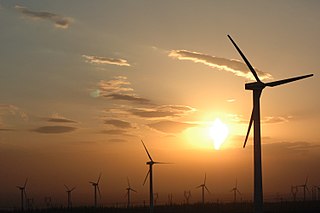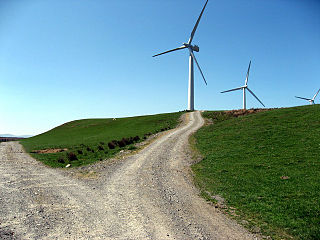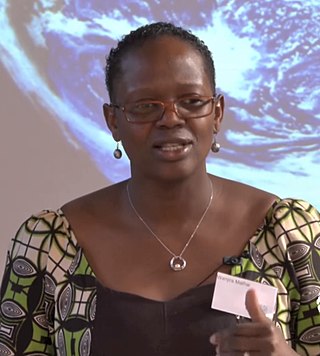
Wangarĩ Muta Maathai was a Kenyan social, environmental and a political activist and the first African woman to win the Nobel Peace Prize. As a beneficiary of the Kennedy Airlift, she studied in the United States, earning a bachelor's degree from Mount St. Scholastica and a master's degree from the University of Pittsburgh. She went on to become the first woman in East and Central Africa to become a Doctor of Philosophy, receiving her PhD from the University of Nairobi in Kenya.
The Green Belt Movement (GBM) is an indigenous grassroots organization in Kenya that empowers women through the planting of trees. It is one of the most effective and well-known grassroots organisations addressing the problem of global deforestation. Professor Wangari Maathai established the organization in 1977 under the auspices of the National Council of Women of Kenya (NCWK). GBM's successes in forest conservation, education, and women's economic empowerment have gained the organisation worldwide acclaim. It is also noted for its advocacy of human rights, democratisation of access to public lands, and environmental justice issues such as the role of women's traditional ecological knowledge in addressing environmental degradation and desertification.
The Global 500 Roll of Honour was an award given from 1987 to 2003 by the United Nations Environment Programme (UNEP). The ward recognized the environmental achievements of individuals and organizations around the world. A successor system of UNEP awards called Champions of the Earth started in 2005.
Energy Saving Trust (EST) is a British organization devoted to promoting energy efficiency, energy conservation, and the sustainable use of energy, thereby reducing carbon dioxide emissions and helping to prevent man-made climate change. It was founded in the United Kingdom as a government-sponsored initiative in 1992, following the global Earth Summit.

Harish Hande is an Indian social entrepreneur, who co-founded SELCO India in 1995. He was awarded with the Ramon Magsaysay Award for 2011 for "his pragmatic efforts to put solar power technology in the hands of the poor, through his social enterprise SELCO India".

The Grameen family of organizations has grown beyond Grameen Bank into a multi-faceted group of profitable and non-profit ventures, established by Muhammad Yunus, the Nobel Peace Prize winning founder of Grameen Bank. Most of these organizations have central offices at the Grameen Bank Complex in Mirpur, Dhaka, Bangladesh. The Grameen Bank started to diversify in the late 1980s when it started attending to unutilized or underutilized fishing ponds, as well as irrigation pumps like deep tubewells. In 1989, these diversified interests started growing into separate organizations, as the fisheries project became Grameen Fisheries Foundation and the irrigation project became Grameen Krishi Foundation.
Low Carbon Communities (LCC) is one part of Marches Energy Agency; a leading climate change and sustainable energy social enterprise and a registered charity, based in the West Midlands, England.

Renewable energy in developing countries is an increasingly used alternative to fossil fuel energy, as these countries scale up their energy supplies and address energy poverty. Renewable energy technology was once seen as unaffordable for developing countries. However, since 2015, investment in non-hydro renewable energy has been higher in developing countries than in developed countries, and comprised 54% of global renewable energy investment in 2019. The International Energy Agency forecasts that renewable energy will provide the majority of energy supply growth through 2030 in Africa and Central and South America, and 42% of supply growth in China.

SolarAid is an international development charity which is working to create a sustainable market for solar lights in Africa. In line with the Sustainable Development Goal 7: "Ensure access to affordable, reliable, sustainable and modern energy for all", the organisation's aim is to reduce global poverty and climate change through providing access to solar lights for rural communities. SolarAid wholly owns the social enterprise, SunnyMoney, the largest seller of solar lights in Africa. SolarAid was founded by Solarcentury, a solar energy company based in the UK.
Bioregional is an entrepreneurial charity, which aims to invent and deliver practical solutions for sustainability. It was founded in 1992 on the belief that overconsumption of resources was the driving force behind environmental degradation, and set out to find new ways to meet more of their needs from local resources.
The Sainsbury family founded Sainsbury's, the UK's second-largest supermarket chain. Today, the family has many interests, including business, politics, philanthropy, arts, and sciences.

Moel Maelogan(shown on O.S. maps as 'Maelogen', and also sometimes spelled 'Moelogan' and 'Mælogan') is a hill on the western edge of Mynydd Hiraethog in north Wales, and overlooking the Conwy Valley. It is known mostly as the general location of a wind farm.
Chris Underhill is an English social entrepreneur.
Global Action Plan is an NGO that specialises in sustainable behaviour change, and in particular in ESD. There are programmes for schools and youth, households and communities, and workplaces. The ethos is that small changes to the choices we make every day make a big difference when widely adopted.
Sunlabob Renewable Energy is a Lao commercial company that provides sustainable renewable solutions to areas that are off the electrical grid. It was licensed in 2001 and its headquarters and base are in Vientiane, the capital of the Democratic People's Republic of Laos. The company operates as a profitable, full-service renewable energy provider selling hardware and providing commercially viable energy services.

ECAMI is a renewable energy business based in Nicaragua, selling solar PV, wind power and hydroelectric systems. ECAMI was founded in 1982 by Luis Lacayo Lacayo, to supply radio communications equipment in rural areas of Nicaragua where infrastructure had been destroyed during the prolonged civil conflict and revolution. Photovoltaics (PV) were the ideal way of powering this equipment, because there was no grid electricity. Many other opportunities for PV became apparent to Lacayo, like home lighting, battery-charging, water pumping and refrigeration. Over the years the provision of renewable energy systems became more important than communications and is now the main activity of ECAMI.
Ecosphere is a social enterprise that works on the sustainable development of Spiti Valley, a cold mountain desert in the Trans-Himalayas of India, by focusing on economic empowerment, environmental conservation and community development.
Masood ul-Mulk TI is a Pakistani expert on humanitarian aid and a development practitioner. He is the CEO of SRSP the largest NGO working to alleviate poverty in North-West Pakistan.
Programme for Economic Advancement and Community Empowerment (PEACE), is a four-year project funded by the European Union. and implemented by the Sarhad Rural Support Programme (SRSP). It was launched in 2013 in all districts of Malakand Division, Khyber Pakhtunkhwa, Pakistan, namely, Swat, Shangla, Buner, Lower Dir, Upper Dir, Chitral and Malakand Agency.

Wanjira Mathai is a Kenyan environmentalist and activist. She is Vice President and Regional Director for Africa at the World Resources Institute, based in Nairobi, Kenya. In this role, she takes on global issues including deforestation and energy access. She was selected as one of the 100 Most Influential Africans by New African Magazine in 2018 for her role serving as the senior advisor at the World Resources Institute as well as for her recent campaign to plant over 30 million trees through her work at the Green Belt Movement.








